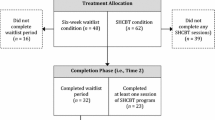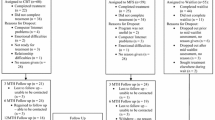Abstract
The problem gambling (PG) intervention literature is characterised by a variety of psychological treatments and approaches, with varying levels of evidence (PGRTC in Guideline for screening, assessment and treatment in problem and pathological gambling. Monash University, Melbourne, 2011). A recent PG systematic review (Maynard et al. in Res Soc Work Pract, 2015. doi:10.1177/1049731515606977) and the success of mindfulness-based interventions to effectively treat disorders commonly comorbid with PG suggested mindfulness-based interventions may be effective for treating PG. The current study tested the effectiveness of three interventions to treat PGs: 1. case formulation driven Cognitive Behaviour Therapy (CBT); 2. manualised CBT; and 3. mindfulness-based treatment. All three interventions tested returned large effect size improvements in PG behaviour after seven sessions (Cohen’s d range 1.46–2.01), at post-treatment and at 3 and 6-month follow-up. All of the interventions were rated as acceptable by participants at post-treatment. This study suggests that the mindfulness-based and TAU interventions used in the current study appear to be effective at reducing PG behavior and associated distress and they also appear to generalise to improvements in other measures such as quality of life-mental functioning and certain mindfulness facets more effectively than the manualised form of CBT utilised used here. Secondly, a brief mindfulness intervention delivered after psycho-education and a brief CBT intervention may be a useful supplement to traditional CBT treatments by addressing transdiagnostic processes such as rumination and thought suppression. Thirdly, CBT interventions continue to report effectiveness in reducing PG behaviour and associated distress consistent with the prevailing literature and clinical direction.

Similar content being viewed by others
References
American Psychiatric Association. (2013). Diagnostic and statistical manual of mental disorder (5th ed.). Washington, DC: American Psychiatric Association.
Baer, R. A. (2003). Mindfulness training as a clinical intervention: A conceptual and empirical review. Clinical Psychology: Science and Practice, 10, 125–143.
Blaszczynski, A., & Nower, L. (2002). A pathways model for problem and pathological gambling. Addiction, 97(5), 487–499.
Bohlmeijer, E., ten Klooster, P. M., et al. (2011). Psychometric properties of the five facet mindfulness questionnaire in depressed adults and development of a short form. Assessment, 18(3), 308–332.
Bowen, N., Chawla, G., & Marlatt, A. (2011). Mindfulness-based relapse prevention for addictive behaviors: A clinician’s guide. New York: Guilford Press.
Bowen, S., & Enkema, M. C. (2014). Relationship between dispositional mindfulness and substance use: Findings from a clinical sample. Addictive Behaviors, 39(3), 532–537.
Bowen, S., Witkiewitz, K., Dillworth, T. M., & Marlatt, G. A. (2007). The role of thought suppression in the relationship between mindfulness meditation and alcohol use. Addictive Behaviors, 32, 2324–2328.
Carmody, J., & Baer, R. A. (2008). Relationships between mindfulness practice and levels of mindfulness, medical and psychological symptoms and well-being in a mindfulness-based stress reduction program. Journal of Behavioral Medicine, 31(1), 23–33.
Carmody, J., Baer, R. A., Lykins, E. L. B., & Olendzki, N. (2009). An empirical study of the mechanisms of mindfulness in a mindfulness-based stress reduction program. Journal of Clinical Psychology, 65, 613–626.
Carmody, J., Reed, G., Kristeller, J., & Merriam, P. (2008). Mindfulness, spirituality, and health-related symptoms. Journal of Psychosomatic Research, 64(4), 393–403.
Chiesa, A., & Serretti, A. (2014). Are mindfulness-based interventions effective for substance use disorders? A systematic review of the evidence. Substance Use and Misuse, 49, 492–512.
Cohen, J. (1988). Statistical power analyses for the behavioral sciences (2nd ed.). Hillsdale, New Jersey: Lawrence Erlbaum.
Cowlishaw, S., Merkouris, S., Dowling, N., Anderson, C., Jackson, A., & Thomas, S. (2012). Psychological therapies for pathological and problem gambling. Cochrane Database of Systematic Reviews. doi:10.1002/14651858.CD008937.pub2.
Cumming, G. (2012). Understanding the new statistics: Effect sizes, confidence intervals, and meta-analysis. New York: Routledge.
de Lisle, S. M., Dowling, N. A., & Sabura Allen, J. (2012). Mindfulness and problem gambling: A review of the literature. Journal of Gambling Studies, 28(7), 19–739.
Dudley, R., Kuyken, W., & Padesky, C. A. (2011). Disorder specific and trans-diagnostic case conceptualisation. Clinical Psychology Review, 31(2), 213–224.
Frank, R. I., & Davidson, J. (2014). The transdiagnostic road map to case formulation and treatment planning: Practical guidance for clinical decision making. California: New Harbinger Publications.
Gavin, D. R., Ross, H. E., & Skinner, H. A. (1989). Diagnostic validity of the drug abuse screening test in the assessment of DSM-III drug disorders. British Journal of Addiction, 84, 301–307.
George, D., & Mallery, P. (2003). SPSS for windows step by step: A simple guide and reference. 11.0 update (4th ed.). Boston: Allyn & Bacon.
Gooding, P., & Tarrier, N. (2009). A systematic review and meta-analysis of cognitive behavioural interventions to reduce problem gambling: Hedging our bets? Behaviour Research and Therapy, 47, 592–607.
Harvey, A. G., Watkins, E. R., Mansell, W., & Shafran, R. (2004). Cognitive behavioural processes across psychological disorders: A transdiagnostic approach to research and treatment. Oxford: Oxford University Press.
Hayes, S., Strosahl, K. D., & Wilson, K. G. (1999). Acceptance and commitment therapy: An experiential approach to behaviour change. New York: Guilford Press.
Hodgins, D. C., Stea, J. N., & Grant, J. N. (2011). Gambling disorders. Lancet, 378, 1874–1884.
Kabat-Zinn, J., Massion, A. O., Kristeller, J., Peterson, L. G., Fletcher, K. E., et al. (1992). Effectiveness of meditation based stress reduction programs in the treatment of anxiety disorders. American Journal of Psychiatry, 149, 936–943.
Keng, S. L., Smoski, M. J., & Robins, C. J. (2011). Effects of mindfulness on psychological health: A review of empirical studies. Clinical Psychology Review, 31, 1041–1056.
Larsen, D. L., Attkisson, C. C., Hargreaves, W. A., & Nguyen, T. D. (1979). Assessment of client/patient satisfaction: Development of a general scale. Evaluation and Program Planning, 2, 197–207.
Lesieur, H. R., & Blume, S. B. (1987). The South Oaks Gambling Screen (SOGS): a new instrument for the identification of pathological gamblers. The American journal of psychiatry, 144(9), 1184–1188.
Linehan, M. M. (1993). Cognitive-behavioural treatment of borderline personality disorder. New York: Guilford Press.
Lovibond, S. H., & Lovibond, P. F. (1995). Manual for the depression anxiety stress scales (2nd ed.). Sydney: Psychology Foundation of Australia.
Maynard, B. R., Wilson, A. N., Labuzienski, E., & Whiting, S. W. (2015). Mindfulness-based approaches in the treatment of disordered gambling: A systematic review and meta-analysis. Research on Social Work Practice. doi:10.1177/1049731515606977.
McCracken, L. M., Gauntlett-Gilbert, J., & Vowles, K. E. (2007). The role of mindfulness in a contextual cognitive-behavioral analysis of chronic pain-related suffering and disability. Pain, 131, 63–69.
Pallesen, S., Mitsem, M., Kvale, G., Johnsen, B., & Molde, H. (2005). Outcome of psychological treatments of pathological gambling: A review and meta-analysis. Addiction, 100, 1412–1422.
Petry, N. (2005). Pathological gambling: Etiology, comorbidity, and treatment. USA: American Psychological Association.
Problem Gambling Research and Treatment Centre [PGRTC]. (2011). Guideline for screening, assessment and treatment in problem and pathological gambling. Melbourne: Monash University.
Riley, B. (2014). Experiential avoidance mediates the association between thought suppression and mindfulness with problem gambling. Journal of Gambling Studies, 30, 163–171.
Saunders, J. B., Aasland, O. G., Babor, T. F., de la Fuente, J. R., & Grant, M. (1993). Development of the alcohol use disorders identification test (AUDIT): WHO collaborative project on early detection of persons with harmful alcohol consumption. II. Addiction, 88(791–804), 1993.
Segal, Z. V., Williams, J. M. G., & Teasdale, J. D. (2002). Mindfulness-based cognitive therapy for depression: A new approach to preventing relapse. New York: Guilford Press.
Slutske, W. S. (2006). Natural recovery and treatment-seeking in pathological gambling: Results of two US national surveys. American Journal of Psychiatry, 163(2), 297–302.
Teasdale, J. D. (1999). Emotional processing, three modes of mind, and prevention of relapse in depression. Behaviour Research and Therapy, 37, 53–77.
Trapnell, P. D., & Campbell, J. D. (1999). Private self-consciousness and the five-factor model of personality: Distinguishing rumination from reflection. Journal of Personality and Social Psychology, 76, 284–304.
Volberg, R. A., Nysse-Carris, K. L., & Gerstein, D. R. (2006). California problem gambling prevalence survey. Chicago, IL: National Opinion Research Centre.
Wardle, H., Sproston, K., Orford, J., et al. (2007). British gambling prevalence survey. London: National Center for Social Research.
Ware, J. E, Jr, Kosinski, M., & Keller, S. D. (1996). A 12 Item Short Form Health Survey: Construction of scales and preliminary tests of reliability and validity. Medical Care, 34, 220–233.
Wegner, D. M., & Zanakos, S. (1994). Chronic thought suppression. Journal of Personality, 62(4), 615–664.
Witkiewitz, K., Bowen, S., Harrop, E. N., Douglas, H., Enkema, M., & Sedgwick, C. (2014). Mindfulness-based treatment to prevent addictive behavior relapse: Theoretical models and hypothesized mechanisms of change. Substance Use and Misuse, 49(5), 513–524.
Witkiewitz, K., Marlatt, G. A., & Walker, D. (2005). Mindfulness-based relapse prevention for alcohol and substance use disorders. Journal of Cognitive Psychotherapy: An International Quarterly, 19, 211–228.
Zgierska, A., Rabago, D., Chawla, N., Kushner, K., Koehler, R., & Marlatt, A. (2009). Mindfulness meditation for substance use disorders: A systematic review. Substance Abuse, 30(4), 266–294.
Acknowledgments
The authors acknowledge the team at the St Vincent’s Hospital Gambling Treatment Program, who helped collect data for this series of studies, and who have provided outstanding care to problem gamblers for over 15 years.
Funding
St Vincent’s Hospital Gambling Treatment Program is funded through the New South Wales Government, Australia’s Responsible Gambling Fund.
Author information
Authors and Affiliations
Corresponding author
Rights and permissions
About this article
Cite this article
McIntosh, C.C., Crino, R.D. & O’Neill, K. Treating Problem Gambling Samples with Cognitive Behavioural Therapy and Mindfulness-Based Interventions: A Clinical Trial. J Gambl Stud 32, 1305–1325 (2016). https://doi.org/10.1007/s10899-016-9602-1
Published:
Issue Date:
DOI: https://doi.org/10.1007/s10899-016-9602-1




